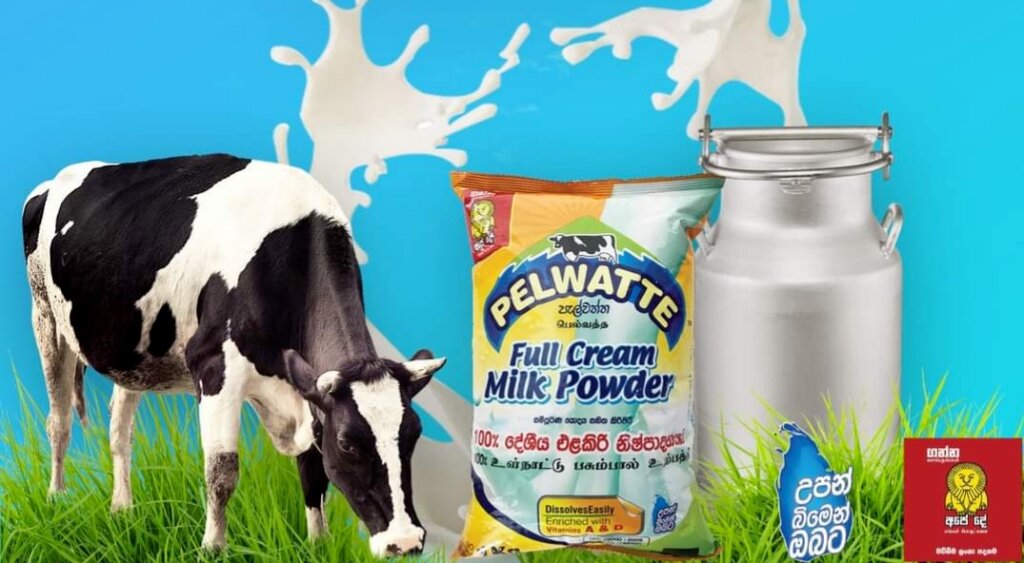
Pelwatte Dairy, one of the leading local dairy brands in Sri Lanka that produces a range of dairy products saving valuable foreign exchange for the country, has assured uninterrupted dairy supplies from its factories despite the recent market price volatilities.
Among the popular items of Pelwatte product line are Pelwatte Full Cream Milk Powder, Pelwatte Butter, Pelwatte Yoghurt, and Pelwatte Ghee Oil.
The milk Pelwatte supply chain is extensive -and does not come cheap since Pelwatte insists only on highest quality fresh milk intakes for its factories. A well-known idea in the industry is “Good dairy products come only from good raw milk.” Pelwatte is no exception when it comes to its dairy chain!
At rural levels farmers pool their daily milk harvests to the Farmer Society. The collections are then picked up by the Pelwatte’s network of hired milk bowsers equipped with temperature preservation capabilities preserving the freshness and hygiene of milk, and they deliver it to PDIL chilling centers. The collection centers’ cold-supply chain tech and thermal preservation systems chill the milk immediately upon receiving it down to four degrees Celsius. From the Milk Collection Centers, specially insulated milk bowsers transport the chilled milk to the factory in Buttala and the milk is offloaded to the insulated chilled milk silo of the Factory. Thereafter it will be ‘standardized’ to maintain agreed levels of fat and Solid-Not-Fat (SNF) level required to create the milk powder. After standardization of the milk, spray drying plant evaporates the water and extracts milk powder output from the milk offloaded to the silo. Throughout the entire chain of production, strict, one hundred percent quality assurance as per ISO 22000:2018 maintained and adhered to by Pelwatte.
The raw milk supply chain for the Pelwatte range of products is derived from the 6500 strong farmer-base in Sri Lanka which directly depends on Pelwatte for their livelihood. The Company has a network of 50 milk collection centers spread across Uva, Eastern, Central, Northwestern, and Northwestern provinces with a huge monthly milk pool of 4.5 million liters of fresh milk. Amid COVID crisis the company also paid Rs.3.18 Bn to the farmers (in 2020/21, which is a 70% year on year increase from 2019/’20). In addition, Pelwatte maintains many free of charge Farmer Welfare initiatives to uplift their living standards, a practice that makes the same farmer-base keep returning to the Pelwatte’s fold every year, for the last four years.
The company also has made significant investments to upgrade its milk preservation technologies to cater to the rising demand for brand Pelwatte and to ensure its milk and dairy products are delivered at highest quality.
As Pelwatte ensures such high levels of quality assurance –one hundred percent and no less-across its overall dairy chain and manufacturing processes, it is clear that it is not feasible (nor wise) to resort to practices of ‘cutting corners’ in this critical process just to lower costs. As a result of not resorting to dairy chain shortcuts but instead closely following on the exhausting series of quality assurance steps, Pelwatte avoids delivering dairy products that are unfit for consumption such as dairy with abnormal odors and colors, off-flavors, debris and sediments and high bacterial counts-all of which are common causes that result in the failure of a dairy brand. Thus it is obvious that when overall national dairy supply chain costs (of production) escalate, it is unavoidable that price increases take effect in the existing dairy product portfolio of the brand as well-unless Pelwatte ‘cuts corners’ in its dairy chain endangering the wellbeing of the Sri Lankan dairy consumer, a practice that Pelwatte would never resorts to due to its commitment to the highest quality.
On average nearly 8.4 liters of raw milk is processes to manufacture just one kilo of milk powder, which shows the high level of extraction required to produce milk powder alone. Therefore, it is appropriate to highlight the key points in the dairy chain where costs surge has impacted.
The main point is the farm gate prices of raw milk. It has been increased significantly and current average price vary from Rs 85 to Rs 105 per litre depending on the region of produce (another reason for the high cost of production of raw milk is that Lankan farmers use of manual or semi-automated farming practices to milk the cows, which Pelwatte is helping them to change through farmer awareness sessions. It should be clearly stressed that Pelwatte does not highlight this fact in order to pass the burden of cost escalation to its prized farmer base! On the contrary, Pelwatte always stands by them for their welfare.
The other key points in the dairy chain where costs increase has impacted are power/energy supplies, packaging, transport and labor –all of which experienced cost increases in significant levels. For instance, packaging material costs alone surged by over 40%.
However, due to the price controls (called as the Maximum Retail Prices -MRP) imposed by the government, Pelwatte continued with same product prices without increasing them at the consumer end while its production costs escalated -and Pelwatte began incurring losses due to continuing with the same selling prices and since 28 April 2020 began incurring losses as a result threatening the very existence of the brand. Finally, Pelwatte reluctantly revised its product prices upward (still, at minimal levels) only to cover cost escalation -but within a justifiable and affordable range that its beloved customers can cope with. If and when these costs go down, Pelwatte too shall immediately lower its selling prices as appropriate with no loss in its well-known high quality….this is the Pelwatte Promise.



